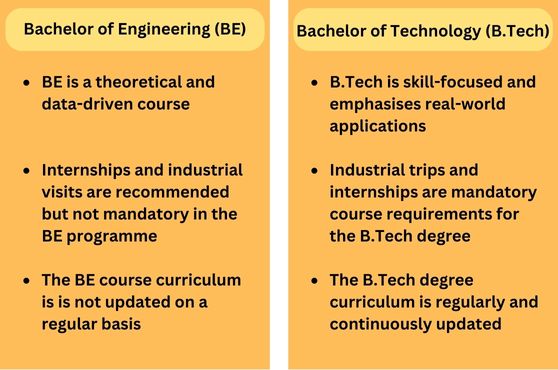BE vs B.Tech: What Is The Right Choice?


A BE or a B.Tech? How do you decide which one to take? Between a BE and a B.Tech, what is the difference? Let’s try and answer these questions. In India, engineering is divided into these two subcategories. It's essential for prospective students to comprehend the distinctions between the two-degree programmes available in universities all across India so that they can enrol in the right one.
Both Bachelor of Engineering (BE) and Bachelor of Technology (B.Tech) are undergraduate engineering programmes. The Joint Entrance Examination (JEE) is the primary entry qualification for the majority of these courses. Both degree programmes typically last four years and share a number of other common features, to the point where they are often used interchangeably. But there is no doubt that the two are different.
Before we dive deeper into the differences between the two, let’s look at the similarities between BE and B.Tech.
Some individuals believe BE and B.Tech are similar, and in some instances, they most definitely are. Read on to know more about the similarities between the two:
Because they are founded on two different educational models, there must be a difference between B.Tech and BE. The B.Tech course and curriculum are continuously updated to meet the most recent industrial needs. The BE, on the other hand, is a theoretically oriented model where the fundamental ideas and theories of the past are essential and given priority.

For students who receive a B.Tech or a BE degree, there are various career opportunities available. Individuals' specific skill set needs, ambitions, and interests ultimately determine whether they should do a B. Tech or a BE course. Considering whether your interests align with a knowledge-based or skill-based degree is a significant factor to take into account while choosing an engineering degree.
A BE degree would be more appropriate for a candidate who is looking for theoretical knowledge. For instance, if you want to learn the theoretical concepts of system designs or how system designs and computer applications work, a BE degree is the one that you should enrol in.
A B. Tech degree, on the other hand, is more appropriate for those wanting a more hands-on and practical education. For instance, if you wish to design real-world practical applications for data processing, the B.Tech programme will be skill-based and teach you how to build computer applications for data analysis.
Due to the various approaches to development, the BE and B.Tech differences must coexist. Additionally, new technologies operate on a range of theories as well as modern practical knowledge, and both degrees are crucial for the development of future educational systems.